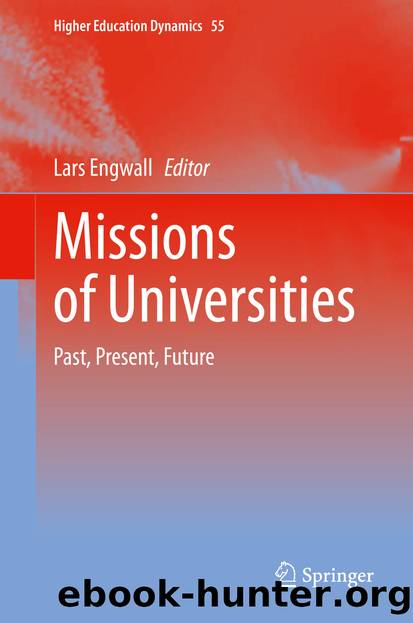Missions of Universities by Unknown

Author:Unknown
Language: eng
Format: epub
ISBN: 9783030418342
Publisher: Springer International Publishing
Excellence in Academia
The issue of the quality of intellectual work is bound to be a vexed one in a culture of accountability because it necessarily involves the exercise of informed judgement in place of purportedly objective measurement. Our society’s solution to this problem can be expressed in a single word, a word that is in danger of becoming so naturalized as part of our discourse that we no longer even notice its fatuity. In practically every official statement or document issued by practically every university explaining its aims or its ‘mission’, you will encounter that institution’s ‘commitment to excellence’.
It is worth pondering the semantic range of ‘excellence’. Roget’s thesaurus rightly gives two clusters of near-synonyms: the first refers to those terms that indicate that something is ‘good of its kind’, and the second to those that suggest it is ‘better than the others’. Excellence connotes both fulfilling the telos of something (it is, for example, sometimes given as a translation of the ancient Greek term areté), but also excelling, rising above, being outstanding. In all ordinal scales of evaluation, we ascend through ‘satisfactory’ to ‘good’ to ‘very good’ and on to ‘excellent’ – the best. So, ‘excellence’ totters unsteadily between being part of an Aristotelian tautology – to attempt to fulfil any purpose is to attempt to exhibit the excellence appropriate to that activity – while also smuggling in the notion that it involves coming out top in some form of competition.
No determinant meaning can be ascribed to the claim that a university is ‘committed to excellence’. Every institution presumably thinks that ideally it should be trying to do whatever it does as well it can. Of course, it is ‘committed to excellence’: what else could it be committed to? Imagine the alternative statement: ‘Only a university committed to mediocrity in both teaching and research can attract the losers of tomorrow. Only universities vigilant about constantly lowering standards can hope to flourish in the global competition to do rather badly.’ But though strictly meaningless, the use of ‘excellence ’ and similar bits of patter does have a function: it signals that the university accepts the sovereignty of the current cant, especially the dominion of audit populism. Its public-relations people and the corporate world’s public-relations people are, in another favoured cliché of our time, ‘singing from the same hymn sheet’. And it not only signals acceptance of the coercive fiction of competition – we try to excel, to beat the others, to win – but, implicitly, it also signals acceptance of the conventional forms of the measurement of achievement.
This is the great unspoken about ‘excellence’: since it is entirely devoid of content in itself, its presence can only be demonstrated by some quantitative evidence recognized by outsiders. To be ‘committed to excellence’ serves to announce that your institution will act as though there were some genuine value in being ranked in, say, ‘the world’s 100 top universities’ or ranked in the ‘top 10’ in the REF, and so on. Yes, says
Download
This site does not store any files on its server. We only index and link to content provided by other sites. Please contact the content providers to delete copyright contents if any and email us, we'll remove relevant links or contents immediately.
Kathy Andrews Collection by Kathy Andrews(10523)
The remains of the day by Kazuo Ishiguro(7557)
Spare by Prince Harry The Duke of Sussex(4201)
Paper Towns by Green John(4171)
The Body: A Guide for Occupants by Bill Bryson(3803)
Be in a Treehouse by Pete Nelson(3216)
Harry Potter and the Goblet Of Fire by J.K. Rowling(3051)
Goodbye Paradise(2965)
Never by Ken Follett(2887)
Into Thin Air by Jon Krakauer(2704)
The Remains of the Day by Kazuo Ishiguro(2621)
The Genius of Japanese Carpentry by Azby Brown(2610)
The Cellar by Natasha Preston(2596)
Drawing Shortcuts: Developing Quick Drawing Skills Using Today's Technology by Leggitt Jim(2532)
120 Days of Sodom by Marquis de Sade(2441)
Architecture 101 by Nicole Bridge(2353)
The Man Who Died Twice by Richard Osman(2301)
Machine Learning at Scale with H2O by Gregory Keys | David Whiting(2295)
Fairy Tale by Stephen King(2073)
